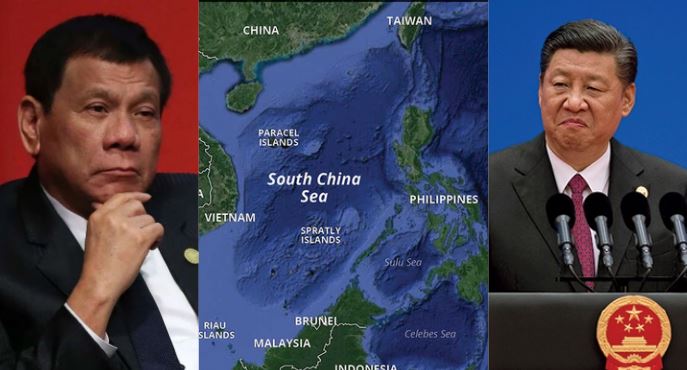China has just suffered another deadly setback in the hotly-contested South China Sea. The Philippines President Rodrigo Duterte, who was till now swinging between the US and China, seems to have finally swung away from China. In a veiled jibe at China, Manila has made it clear that it is ready to defend oil and gas exploration rights in its internationally recognised waters in the disputed South China Sea.
Duterte has lifted a six-year-old moratorium on oil and gas exploration in three offshore areas West of the Southeast Asian country, on the recommendation of the Department of Energy. The three offshore areas include the potential oil and gas-rich Reed Bank, which is also claimed by China. And the Philippines has gone ahead with the key decision without informing or consulting China. Manila is therefore asserting the Philippines’ sovereignty on its Exclusive Economic Zone.
The Philippines’ decision to resume oil and gas exploration in Reed Bank is, in particular, going to be irksome for China. Reed Bank is a major flashpoint between China and the Philippines, and there is at least one past instance in 2011 of Chinese ships trying to harass a Filipino exploration vessel in Reed Bank.
Duterte administration’s Energy Secretary Alfonso Cusi has said that companies with government exploration contracts have been asked to resume their petroleum search, effectively ending the six-year-old moratorium was imposed in 2014 by Duterte’s predecessor, Benigno Aquino III, while the Philippines was awaiting a ruling in the South China Sea dispute by the Permanent Court of Arbitration in the Hague.
In 2016, the Permanent Court of Arbitration largely ruled in favour of the Philippines and declared Beijing’s so-called historical claims to almost the entire South China Sea invalid. China nevertheless refused to participate in arbitration and called its verdict a “sham”. Duterte himself stormed to power in the Philippines in 2016 itself, and his initial years marked a China ‘pivot’.
Beijing’s strategy was to instigate Duterte to get the 2016 arbitration award undermined and pursue joint exploration in the hotly contested waters. In 2018, the Philippines and China even agreed to set up a special panel to decide how they could undertake joint exploration.
However, the latest announcement by the Philippines shows that Duterte has kicked China out of his country’s Exclusive Economic Zone. Cusi disclosed in an online news conference on Friday that China was not informed about the Philippines government’s decision to resume oil exploration in its EEZ.
The Philippines is applying the U.N. Convention on the Law of the Sea here. Manila has exclusive right to exploit maritime resources up to a distance of 200 miles from its baseline regardless of China’s extra-legal claims in the South China Sea.
Cusi said that Reed Bank and the two other offshore areas where exploration will be resumed are within the Philippines’ EEZ, but Beijing is likely to assert its claim. He added, “They will not just take it without raising a word. I’m sure they’re going to write us.”
But the Philippines will not bow down to Chinese bullying anymore. The Philippines Energy Secretary said, “We have to stand up for our rights, that’s what we are going to do.”
Cusi has said that exploration companies have been given the assurance that they would be protected by a 500-metre security buffer zone. He added that he expected “China will be respecting that.”
It is clear that Manila has taken China by surprise. The Philippines today has the backing of the other Indo-Pacific giant, the QUAD- an informal coalition comprising India, the US, Australia and Japan that aspires to contain growing Chinese influence. Therefore, Manila is making it clear that it doesn’t care for China’s salami-slicing tactics anymore.
Meanwhile, China itself is feeling compelled to put up a brave face despite having been pushed back by the Philippines. Now, China is trying to somehow reconcile itself with Manila’s growing assertiveness. Bloomberg has quoted Ministry spokesman Zhao Lijian as saying, “China and the Philippines have reached consensus on the joint development of oil and gas resources in the South China Sea, and we have established relevant consultation and cooperation mechanism.”
Lijian added, “We hope the two sides can work together for new progress in the joint development.” China is therefore left begging the Philippines not to kick it out of its oil and gas exploration programme.
The Philippines has started drilling the potential oil and gas-rich portions of its internationally recognised waters. And China cannot fathom the sudden defiance that it is facing directly from Manila.








